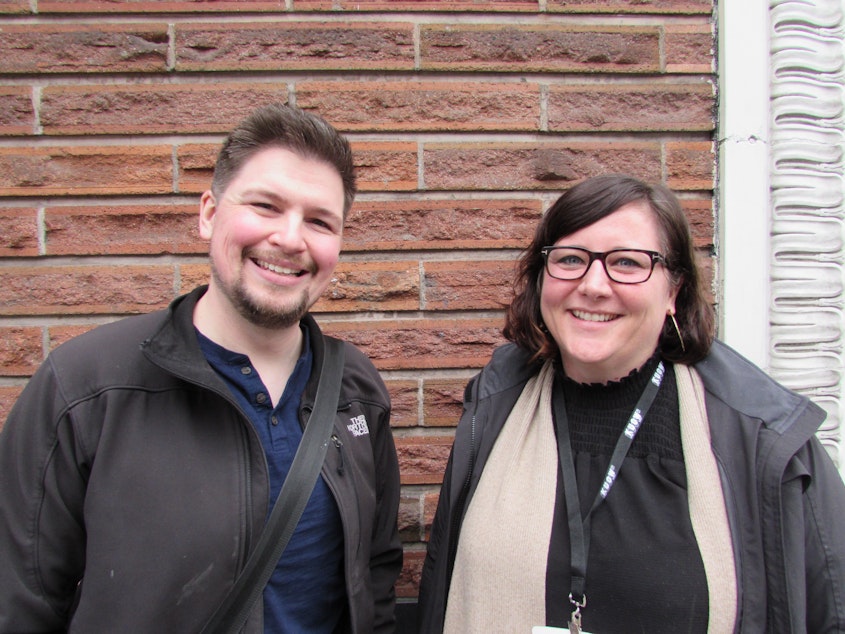WA state's dispute with Facebook leaves campaigns in a pinch

You've probably seen political ads for state and local candidates in your Facebook feed.
But if you live in Washington state, you shouldn't.
Companies like Facebook and Google say they no longer accept political ads from state and local candidates within Washington because they can't meet the state's public disclosure requirements for campaign ads.
But many ads still get through, adding to the confusion. Meanwhile, campaign consultants say Facebook is a crucial method of reaching voters.
Reporter Amy Radil spoke to KUOW’s Paige Browning about a bipartisan team of political consultants asking state officials to find a prompt solution.
Washington state has a strong law regarding campaign ads on social media. Anyone who runs a political ad for a state or local race — like a newspaper, or a TV station, or a digital advertiser — has to be able to disclose what the ad was and who paid for it.
Washington has sued Facebook and Google in the past to make them comply with its disclosure laws. Facebook says they can’t comply, because the ads don't go through a human who can get that information. So they’re just not going to accept political ads from Washington altogether.
Sponsored
Campaign consultant Josh Amato has worked for past gubernatorial candidate Rob McKenna and King County Sheriff Mitzi Johanknecht. Erin Schultz is a consultant who previously worked with Gov. Jay Inslee and Seattle City Councilmember Teresa Mosqueda. They teamed up to ask state regulators to help solve this problem.
Campaigners say social media is where voters are, and it's one of the most affordable places for small campaigns to advertise. Schultz said it also gives some good feedback for small campaigns that can’t afford to do polling.
“It helps you better understand what people are responding to, what’s sort of a lightning rod, what issues are capturing people’s attentions,” Schultz said.
Local campaigns therefore don't like to be cut off from this method of reaching voters.
It’s still legal for campaigns to buy the ads, and many do. Sometimes those ads get posted, in other cases Facebook takes them down. Schultz said even though it’s legal from the campaign side, voters are somewhat aware of this controversy, so they see the ads as shady.
“We’re not advertising on Facebook," Schultz said. "I think the confusion among voters just makes it a dangerous place to be.”
Sponsored
Amato said he’d rather advertise elsewhere because of the uncertainty.
“It’s too much of a hassle on these small campaigns with these little budgets to work up all the creative for these ads and then have it shut down a day later," he said. "It’s not a good use of the campaign’s money.”
Consultants said they want the state to create a public ad archive that they would maintain — a step that a few other states have taken. Campaigns could file the ads they run with this state archive, just like they already file their financial reports.
This would take companies like Facebook off the hook for having to disclose all this detailed information and free up the campaigns to advertise there again.
But cybersecurity experts say "bad actors" seeking to interfere in our elections aren’t going to submit their ads to the state, that’s why they say platforms like Facebook need to be the ones responsible. Schultz said she really wants officials to act quickly to find a solution.
Sponsored
“I really feel like we have so many important issues to discuss and so many important voters to reach, and if we can’t communicate with younger voters on social media in 2020 that seems like a really big loss to me,” she said.
State regulators at the Public Disclosure Commission said they are exploring the idea of running an ad archive. But right now, it doesn’t seem likely that the standoff between Facebook and Washington state will be resolved in 2020.
A proposed settlement between Facebook and the Public Disclosure Commission would mean the tech giant pays $75,000, according to The Stranger. But critics contend this settlement is inadequate because Facebook isn't admitting to any wrongdoing or committing to change its practices.
The Public Disclosure Commission is scheduled to consider that proposal at their upcoming meeting on February 27.





